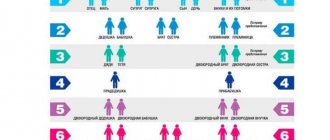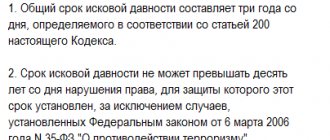According to Federal Law No. 146 of 2001, inheritance recognizes the transfer of the property of a deceased person to other persons. At the same time, it is carried out in two ways: by force of law or on the basis of a will left by the deceased. In practice, the first method is most often used. It also causes more controversy. The main disagreements arise at the stage of division of the property of the deceased, when the heirs of the first priority without a will are determined. To these, in the absence of a testamentary document, Art. 1142 of the Civil Code of the Russian Federation includes the spouse of the testator, parents and children.
Spouses
A husband or wife has the right to inherit after the death of their spouse, provided that:
- at the time of the death of the testator, an official marriage was registered;
- The court decision on divorce at the time of opening the inheritance did not enter into legal force.
Important! A person who cohabited with the deceased or is married to him in a church marriage does not apply to successors called to inherit.
If the inheritance was acquired during an official marriage, then only the part that belonged to the deceased is subject to division. As a rule, this is half of the joint property with the husband or wife.
The procedure for dividing inheritance upon the death of a wife
Property acquired by spouses during their official marriage is recognized as joint property. If a woman dies, half of the common property goes to her husband. This is the mandatory marital share specified in Art. 1150 GK. From the second half, equal shares are allocated for each heir.
Based on Art. 1157 of the Civil Code, any of the legal heirs has the right to write a waiver of the inheritance in favor of another heir, transferring his share to a specific person. If he does not take any action and does not accept the inheritance on time, his share is divided equally among other relatives.
If a woman had a dependent during her lifetime, then he inherits the obligatory share. This condition is spelled out in the law to ensure financial support for an incapacitated person; it is impossible to transfer the obligatory share to another person.
To learn more about inheritance after the death of one of the spouses, ask questions in the comments to the article
Parents
The father and mother of the deceased are called upon to inherit as priority legal successors. At the same time, both blood (biological) parents and officially appointed adoptive parents have the right to inherit.
The possibility of receiving an inheritance is excluded if:
- heir (father or mother), deprived of rights in relation to the deceased child;
- the adoptive parent is deprived of his status by court decision.
Parental relationships do not matter in this case. They can be either officially married or divorced.
Problem situations
Let's take a closer look.
Inheritance from a grandparent if the parent is no longer alive
This situation is called representation inheritance.
In this case, the share that was intended for the first-degree heir (parent) will go to the child. If he is not alone, then the share will be divided according to the number of children. To enter into inheritance rights by nomination, you will need documents confirming family ties, as well as the right to a share in the parent’s inheritance.
Recognition of the heir as unworthy
Only the court has the right to assign the status of unworthy to an heir. To do this, the heir must commit acts against the testator that characterize him in a negative way:
- Committing a criminal act against the testator or other heirs;
- Attempts to distort the last will of the deceased, leading to an increase in one’s own share;
- Deprivation of parental rights;
- Avoidance of support and care for a relative in need.
Refusal of inheritance
Accepting an inheritance is the right of a citizen, but no one can oblige him to accept an inheritance if he does not want to. To renounce the inheritance, he must write a statement to a notary. He can renounce his share in favor of another heir. If there are no specific preferences, his share will be distributed among other heirs. If there are no other heirs, the inheritance will pass to the state.
Children
Just like parents, natural and adopted children are called among the priority heirs.
Illegitimate children have the right to inherit subject to a proven fact of kinship, for example, if paternity is established or there is a result of a genetic examination.
Stepsons and stepdaughters are not first-degree successors, except in cases where the testator officially adopted them.
If on the date of death of the parent, the child was conceived, the division of the inheritance in accordance with Art. 1166 of the Civil Code of the Russian Federation can be carried out only after his birth.
Important! If the deceased parent was deprived of parental rights, the child retains the right to inherit property after his death.
Inheritance by law. Order of heirs
Ancient wisdom says that in a good way, an inheritance should be shared with “warm hands.” That is, it is better to divide the future inheritance while the person is still alive and can come to an agreement with his relatives about what will go to whom after his death. The family finds compromises together, after which a will is written that suits everyone.
Unfortunately, this does not happen often, largely because it is not customary in our culture to talk openly about impending death. And after the death of the testator, the family begins to sort things out on their own.
If a will is not drawn up, the inheritance is distributed according to the law. 7 lines of inheritance have been defined in descending order of degree of kinship (and a special category: disabled citizens who lived as dependents of the testator). The principle is this: the entire inheritance goes to the first priority heirs.
If there are none (for example, they died earlier), the right of inheritance passes to the second. If there are also no heirs of the second stage, or they do not declare their rights to the inheritance, the right passes to the third stage, and so on.
In this article we consider the situation when there are heirs of the first priority and are ready to enter into inheritance rights. We will discuss all aspects of this process.
Dependent persons
From Article 1148 of the Civil Code of the Russian Federation it follows that disabled citizens who were dependent on the testator for at least a year during the life of the testator, regardless of whether they lived together or separately, have the right of inheritance on an equal basis with the line called for succession.
At the same time, a dependent may belong to the number of heirs in subsequent stages, and the very concept of dependency implies not only people who are disabled due to age or illness, but also citizens of pre-retirement age (men who have turned 60 years old and women who have reached 55 years of age).
Legislative regulation
Inheritance issues are regulated by the Civil Code and the Constitution of the Russian Federation.
Thus, Article 63 of the Civil Code of the Russian Federation determines the possibility of receiving the capital of a deceased person according to the law. Art. 1142 – 1148 of the Civil Code of the Russian Federation establishes the order in which successors receive inheritance.
Legal acts of family, tax, executive and other legislation regulate the procedure for obtaining inherited assets, paying state fees when performing registration actions and other legally significant operations.
The activities of a notary when registering shares of an inherited estate are established by orders and methodological recommendations of the Ministry of Justice of the Russian Federation.
Unworthy heirs
To such art. 1117 of the Civil Code of the Russian Federation includes persons:
- who committed criminal acts against the deceased or other heirs;
- who have committed illegal actions with the aim of calling for inheritance or increasing the share of the inheritance;
- who are the parents of the deceased, if they are deprived of rights in relation to him.
At the initiative of an interested person, the court has the right to remove the successor from inheritance if he maliciously evaded the obligation imposed on him by force of law to support the deceased person.
Important! Illegal actions must be proven in court by providing evidence.
Why the heir of the first priority may not receive an inheritance
Sometimes the behavior of children or their lifestyle drives loving parents to the point that they deprive them of the opportunity to receive an inheritance. If this is written in the last will of the deceased, then the heir may try to contest the will, but he is unlikely to succeed.
The inheritance may not go to someone who is found unworthy. This can also be stipulated in the last will, or it can be proven in court by relatives.
Parents who were deprived of parental rights, and at the time of their death the rights were not restored, cannot receive an inheritance after their children. But a child, thus deprived of his parents, but not adopted by anyone, remains their heir.
The deceased can leave all the property by will to any person, organization or state, then there is no question of any lines of heirs.
But if they try to contest the will, proving that the relative was not legally competent at the time of its execution, or executed it incorrectly, etc., then the order of succession in receiving the inheritance again comes into force, and the first in line again are the parents, children, and spouse .
Distribution of inheritance
The successors of the deceased at the same level inherit the property in equal parts. The exception is the successor representation.
The latter are called upon to inherit in the case when the successor by law at the time of opening the inheritance is not alive or when he died at the same time as the testator. If there are several, the share of the deceased heir is divided equally between them.
The right of a spouse to half of the property acquired during marriage deserves special attention. So, if there is a spouse among the heirs, his share is initially allocated, which by default is considered equal to 50%. After allotment, the remainder of the deceased spouse is divided among the first-degree successors.
Order of succession without a will
When establishing the fact of the absence of a testamentary document, the law (Article 1141 of the Civil Code of the Russian Federation) adopted a special system for the distribution of inheritance.
Read more about the order of inheritance here, and find out more about heirs by right of representation in this material.
It consists of dividing close and distant relatives into groups according to the degree of relationship. In this case, those who are closest have an advantage in acquiring the desired property, while those who are more distant have an extremely small chance of this.
There are currently eight succession queues in total. If there is no one in the first of them (or everyone has died or unanimously abandoned the property), the right passes to representatives of the second order.
Main heirs
These include:
- parents;
- children;
- spouse of the deceased.
According to the rules, they divide among themselves all the property left behind into equal parts or can agree among themselves on what items will go to each of them (Article 1142 of the Civil Code of the Russian Federation). To do this, you need to draw up an agreement that does not need to be confirmed by a notary.
If all the heirs of the first priority are dead or do not want to accept the property, then after their refusal, their heirs (grandsons and granddaughters of the deceased) can do so. The law calls this the right of representation. If the deceased has illegitimate children or descendants from a previous marriage, then they are also treated as primary heirs and can enjoy all rights on an equal basis with other children.
Other persons in the first place
In addition to the closest relatives by blood, there is a possibility for other persons to be included in this list (Article 1149 of the Civil Code of the Russian Federation). This happens because the law protects the rights of the socially weaker sections of society if they cannot defend them themselves.
Important! In rare cases, they may be deprived of part or all of their inheritance share.
This happens if they have never used the property that should go to them, but other claimants to the inheritance need it for permanent residence or is their main source of income. The financial condition of the obligatory heirs is also taken into account.
Adopted children
The law equates the rights of adopted children with the rights of ordinary natural children. Consequently, they can unconditionally exercise their right to inherit the property of their father or mother. However, since they lose contact with their biological parents upon adoption, they cannot inherit from each other.
If the court has established permission for the adopted child to communicate and communicate with his blood parents (or one of them), then the possibility of inheritance for them remains.
Dependent relatives
They are a special category of the population that retains an extraordinary right to receive part of the inheritance. This means that regardless of the will or order that receives the inheritance, they have their own legal share of the property.
However, this only works if such relatives were dependent on the deceased for at least a year and their incapacity for work is documented. The degree of relationship is absolutely not important.
Applicants without family ties
They are also included in the category of people who acquire their share, despite the presence of a will and priority. If such persons were considered dependents of the deceased for more than a year and lived side by side with him, and their incapacity for work was proven through the court, then they have the right to their share of the inheritance.
Sequence of acquiring an inheritance
To acquire an inheritance, it is necessary that each of the successors accept it. 6 months are allotted for this, before the expiration of which the heir must contact the notary office at the place where the inheritance is opened to submit an application for acceptance.
The place of discovery is the last known place of residence of the deceased, and if it is unknown, then:
- the place where the property of the deceased is located;
- location of movable property or the most valuable of them;
- a settlement on whose territory the most expensive real estate property is located.
After a six-month period, each of the heirs receives their share of the property and debt obligations of the testator.
Crib
- Collect a package of required documentation confirming the opening of an inheritance, the applicant’s inheritance rights and the ownership of the deceased.
- Find out if there is a will. If there is one, find a copy of it or issue a duplicate and mark that it has not been canceled or changed.
- Draw up an application for acceptance of the inheritance and issuance of a certificate of inheritance.
- Within six months from the date of death of the testator, submit an application along with the attached documents to the notary at the last place of residence of the deceased.
- Wait until 6 months have passed since the death of a relative and obtain a certificate of inheritance. If there is a will and dependents, the timing changes.
- If there is real estate in the inheritance estate, register the rights to it with Rosreestr, the vehicle - with the State Traffic Safety Inspectorate.
Acceptance of inheritance after expiration
In cases where the heir did not have time to submit the application, restoration of the lost deadline for acceptance will be required. The restoration of the latter is carried out through legal proceedings if there are compelling reasons. The successor will have to prove that the missed deadline was due to ignorance or another worthy reason.
Important! The application must be submitted before the expiration of 6 months from the date on which the reason for absence no longer exists.
An out-of-court procedure for restoring the deadline is also allowed, the implementation of which requires an application to a notary office by writing a written consent by all applicants.
In both the first and second cases, the result will be the cancellation of previously issued certificates.
Good practice
The outcome of a case in court if a deadline is missed largely depends on the completeness of the evidence presented and compliance with the requirements of the law.
Here is one such example: On the date of death of citizen N. there were no primary heirs, so two sisters took over. The testator's third sister had already died by this time, and her son was working abroad. Soon the nephew of the deceased returned to the country and learned that, by law, he was entitled to a third of his uncle’s property.
Since 8 months had passed since the death of his relative, the man went to court. In his statement, he referred to the fact that his aunts did not inform him about his uncle’s departure and presented the following documents as evidence of the missed deadline:
- an agreement with an employer, under the terms of which the man was sent on a business trip abroad for a period of 1 year;
- return ticket;
- testimony of witnesses confirming the fact of deliberate failure to inform the heir of the news of his uncle’s death.
Having studied the case materials, the court found the plaintiff’s arguments justified and convincing, and the defendants’ arguments weak, and then satisfied the heir’s demands in full.
Who are they after the death of their husband?
The testator leaves behind various movable and immovable property, cash savings and securities. He may also leave a huge amount of debts that the heirs will have to pay if they do not decide to refuse to receive the inheritance.
So, who is the first-line heir after the death of her husband?
- legal wife (or husband) can claim the right to inheritance , since she comes first (find out more about whether spouses have the right to inherit if the other half has died, here).
- Also, his children will receive part of the inheritance , and it does not matter whether they were born in marriage or not .
- Children from a previous marriage and adopted children can also count on a share of the property of the deceased parent.
- Parents of the deceased spouse.
If, at the time of marriage, the spouses did not enter into a marriage contract and other heirs from the first priority have no objections, then all the possessions of the deceased are divided between them into equal parts. Otherwise, they must agree on the size of each part.
For more information about whether a wife has the right to a share after the death of her husband and how to enter into an inheritance, read this material.
It also happens that ownership shares are unequal. For example, if the inherited apartment belonged not only to the deceased, but also to one of the family members, he also receives an inherited share in addition to his legal part.
Any relative can take advantage of the opportunity to refuse the inheritance received (Article 1157 of the Civil Code of the Russian Federation). This must be done by writing an application to a notary office within six months.
If during this period the relative does not express a desire to receive or give up the property, then this is considered as a refusal and all available property is divided equally among the remaining relatives.
In cases where a will has not been written, all relatives from the first priority who wish to receive an inheritance must, within six months from the date of death, contact a notary agency , where a special application is submitted.
Does a common-law wife have the right to be a successor?
In modern legislation, the concept of “civil marriage” is a little different from what it is commonly considered in everyday speech. A young couple living together, but not registering their relationship with the registry office, is considered cohabitants.
They can live in the same apartment for a long time, have a common budget and run a household together, have children, but their relationship is not formalized in any way in documents. This means that there is no legal relationship between them as a family.
The main disadvantage in this state of affairs is that all the things (be it movable property, real estate, household items) that they acquired together can go to completely different people.
If one of the common-law spouses dies, the second of them can inherit something only if a will is drawn up or the surviving spouse is considered disabled or a dependent.
But even when a will is drawn up, part of the deceased’s property may go to a person who is not indicated in it . To do this, he must be a disabled dependent person and live with the deceased.
A common-law wife can still receive part of the inheritance even without a will. But to do this, she will have to provide in court undeniable evidence that they lived together, ran a common household and acquired property together, and this is quite difficult to do.
This takes into account:
- general registration in a house or apartment.
- Common children.
- Information received from relatives or neighbors that the spouses lived together.
- Documents and receipts for goods that will confirm their joint purchase.
Find out more about whether a common-law wife has the right to inherit after the death of her husband here.
Sometimes one of the spouses receives an inheritance and during a divorce the question of how to divide it arises. That's why the site has the following articles:
- When is an inheritance considered joint property?
- Is inheritance divided between spouses during a divorce and what to do with property received during marriage?
- Rights of a spouse when inheriting property jointly acquired with her husband.
Algorithm for entering into inheritance
The procedure for entering into an inheritance in the absence of a will includes only a few steps:
- Contacting a notary (in person, through a representative with a power of attorney, or by sending documents by mail). At this stage you will need:
- statement;
- personal passport;
- death certificate;
- document confirming relationship;
- a document confirming the fact of residence of the deceased at a specific address.
- Waiting for the six month period to expire.
- Obtaining a certificate.
- Registration of the transfer of rights to real estate objects (if they are part of the inheritance mass).
Who is not included in the circle of priority recipients
Other relatives are not included in the list, with the exception of spouses, children and parents.
They are considered as heirs in the absence of the above persons. Read also: Invalidation of a will
A person will be excluded from priority recipients if:
- in court he will be given the status of an unworthy heir;
- there is a testamentary document that states that a specific person will not receive an inheritance.
As a result, the heir is deprived of the opportunity to claim the inheritance. He has the right to appeal the above decisions.
Important! If the testator wished to disinherit a disabled dependent, as expressly indicated in the will, he will not be able to do this. Such persons are protected by law and are entitled to a mandatory share in the inheritance.
Price
The heir's main cost line consists of the cost of the state fee for issuing the certificate. So, in accordance with Art. 333.24 of the Tax Code of the Russian Federation, the successor of the deceased is obliged to pay:
- 0.3%, but not more than 100 thousand rubles of the value of the inherited property (for successors of the 1st stage, as well as brothers and sisters);
- 0.6%, but not more than 1 million. rubles (for other heirs).
The value of the deceased's estate is assessed on the basis of inventory or cadastral documents. In some cases, an independent examination may be appointed.
If several heirs claim the property of the transferor, each pays a fee in the amount of his share.
If the deceased spouse made a will
If the deceased person left behind a will, the matter of transferring property into the hands of other persons is greatly simplified. Usually this document indicates by listing all the people who, at the request of a person, receive all of his property .
The will can be left to one person and then he will receive the entire property or to several people and then they will receive equal shares. If you distribute the desired shares between the heirs on paper, the notary will divide the property in accordance with this information.
Persons omitted from the will do not have rights to the property of the deceased unless they are obligatory heirs.
Indivisible property
The law recognizes as such things that cannot be divided in kind. If a dispute arises regarding who will receive the indivisible thing, the rules of Art. 1168 of the Civil Code of the Russian Federation. According to the latter, the preemptive right is vested in the successor:
- jointly with the deceased, who had the right of common ownership of an indivisible object;
- who, unlike other heirs, enjoyed an indivisible thing;
- who lived until the death of the testator in an undivided residential premises and has no other housing.
The successors of the first stage in the inheritance are important. If the closest relatives could not know about the opening of the inheritance case, and can prove the conscientiousness of the missed deadline, the legal successors who accepted the property will be obliged to return the excess. Even if things and real estate have already been sold, relatives have the right to the cash equivalent. That is why it is better to take all possible means to find legitimate successors.




